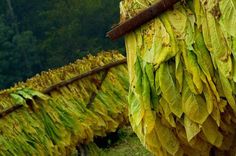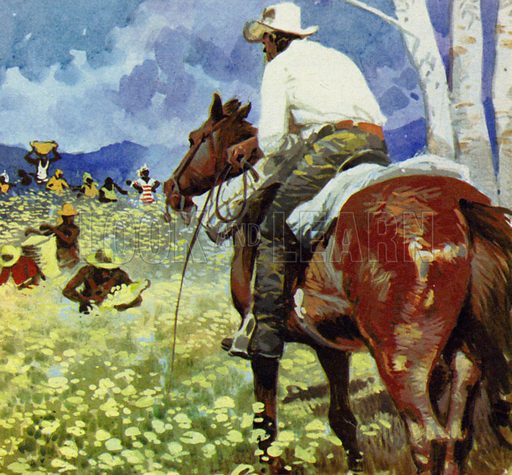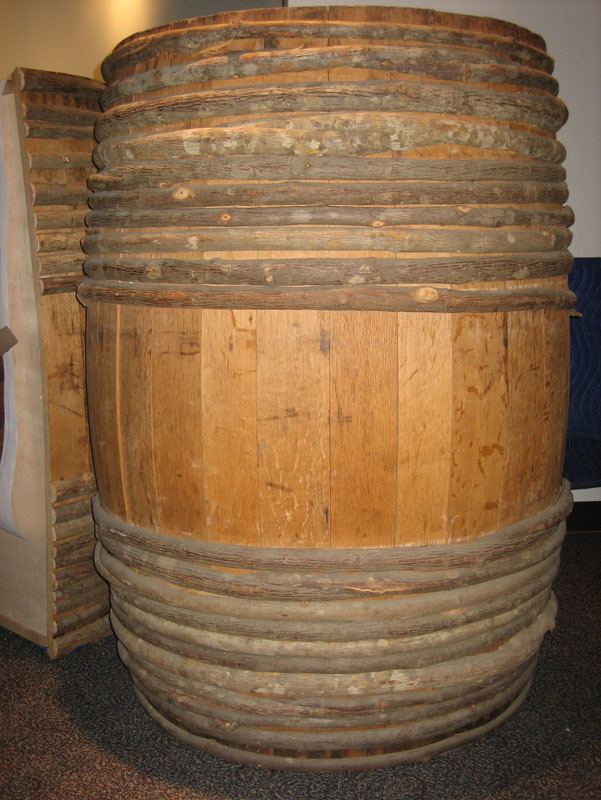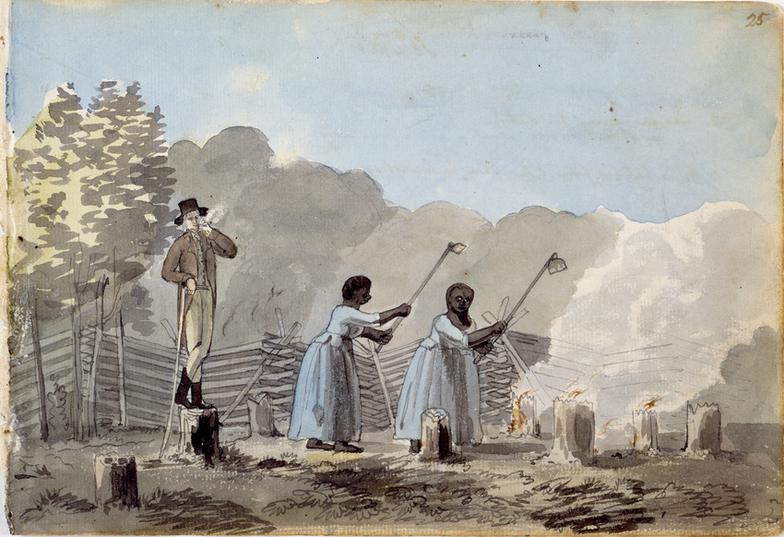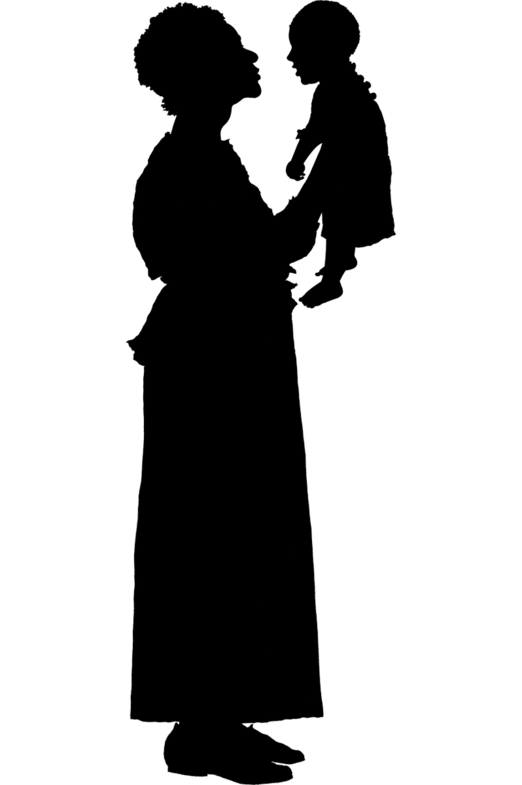SoulsinMyFamily.org
Bagwell, a little boy just four years old, must have been very excited. Bagwell and his brother George as well as their mother,Ursula, were going to live at Monticello. Their family would be united there with the boys father, Great George.
At the request of his wife Mr. Jefferson purchased this family. Ursula, a skilled pastry cook would be working in the Monticello kitchen. Along with Ursula he bought Great George, uniting the family. Great George would later become an overseer on the farm. Mr. Jefferson wrote a record of his purchases in his Memorandum Book:
"Jan. 21. Bot. Ursula, and her sons George and Bagwell of Fleming's estate for L210. 12. month's credit."(1)
"Dec. 30. Assumed to pay T. Garth 3/ by order Wm. Pond (for great George)." (2)
United at Monticello
Minerva's Family
Minerva was a little girl about two years old when her family was given to Mr. Jefferson in repayment of a debt owed him by his mother. Minerva's parents, Squire and Belinda, were both field hands. They are listed as living at Shadwell, the farm at the foot of the mountain. Ownership of the family was transferred to Mr. Jefferson from his mother in 1773.
Minerva and Bagwell spent their entire lives working as field hands or "labourers in the ground" at or near Monticello. The Farm Book
first mentions the term in a Role of Proper Slaves. (3)
Learn a Trade or Work the Land?
Bagwell's brothers, Isaac and George, were trained in the blacksmithing trade. The likely experienced more freedom than the average slave. Isaac was sent to Philadelphia to learn tinsmithing. Little George (also called Smith George) was in charge of the blacksmith shop. Bagwell, as a field hand, probably rarely left the farm.
Minerva, like many female field hands, would work in the fields doing hard physical labor. Although unskilled, she would still be considered a valuable slave. Minerva had nine children and they represented future workers for the plantation. Mr. Jefferson wrote to a relative:
"I consider a woman who brings a child every two years as more profitable than the best man of the farm. what she produces is an addition to the capital, while his labors disappear in mere consumption." (4)
He also believed that pregnant slave women should have extra care in order to have healthy babies and stressed the idea to his Poplar Forest overseer:
"...the mortality among our negroes is still more serious as involving moral as well as interested considerations. they are well fed, and well clothed & I have had no reason to believe any overseer, since Griffin's time, has overworked them. accordingly the deaths amng the grown ones seem ascribable to natural causes. but the loss of 5. little ones in a year induces me to fear that the overseers do not permit the women to devote as much time as is necessary to the care of their children; that they view their labor as the 1st object and the raising of their child as secondary...it is not their labor, but their increase which is the first consideration with us..."(5)
Life as a Field Hand
Life as a field hand was hard labor. The work day began at dawn and ended at dusk. In summer that could be a fourteen hour workday. When her work in the fields was over, Minerva still needed to feed her family, tend her garden, and do all the chores in her cabin. Her day must have been long and exhausting.
Most slaves grew their own vegetables and raised chickens for eggs. Many sold extra produce, such as cabbages and corn, to Mr. Jefferson for use in his household. This was a way they could earn some money. He would always note the sale in his Memorandum Book. Two of these entries were:
"Dec. 6. Pd Goliah for corn 1.D" (6)
"Nov. 5. Isaac 50. cabbages 1.50..." (7)
Bagwell sold fish to Mr. Jefferson which were likely held in the fishpond on the West Lawn and served in the Dining Room. As usual he noted:
"May. 24. Paid Bagwell for 24. fish 24/." (8)
Tobacco - Theirs vs. Mine?
Mr. Jefferson did not allow his slaves to grow their own tobacco, as he believed it too difficult to keep his own tobacco crop separate from theirs. He wrote to his son in law:
"...I thank you for putting an end to the cultivation of tobacco as the peculium of the negroes. I have ever found it necessary to confine them to such articles as are not raised for the farm. there is no other way of drawing a line between what is theirs & mine." (9)
House Slave or Field Hand ?
Minerva's mother-in-law, Ursula, was the wife of Great George and worked as a pastry cook in the Monticello kitchen. Her work was very different from Minerva's but while Ursula didn't have to work in the fields, a cook still had hard labor. Her kitchen was very warm with a fire burning every day of the year including the hottest days of summer. Working around an open fire was dangerous work. She was required to work long days to feed all the family and guests in the household.
House slaves and field hands were in very different situations. A house slave might be more familiar with the family but was under closer supervision. They might receive nicer clothes and leftover food from the kitchen, but there was little privacy in the main house. There is no evidence that slaves slept in the house, but some had rooms under the terraces.
A field hand worked very long hard days but may have had more independence, especially from an easy going overseer. Some workers might have preferred outdoor work, or wanted to work closer to their husband or wife on the farms.
Mr. Jefferson wrote to his Poplar Forest overseer :
"I shall very willingly let you have Lucy at a fair valuation by neighbors, if she is willing to be sold, as I have little \doubt/ she would be. she would certainly prefer the situation of a house servant under mrs Yancey & yourself and so near her friends to working in the ground under an overseer." (10)
Things to Think About
If you had to choose, would you rather work as a house slave like Ursula or in the fields like Minerva?
Did Ursula have a day off every week like the field hands?
Do you think Lucy had a say in whether she wanted to be sold? Mr. Jefferson says "if she is willing..."
Why would he assume she would want to be a house servant over working in the fields?
Working for Mr. Craven
During the eight years Mr. Jefferson served as President of the United States, Minerva and Bagwell and forty-six other slaves were leased out to John Craven. He was renting lands at Tufton, one of Monticello's outlying farms. They worked as field hands for Mr. Craven, under the following agreement:
"This indenture made on the 23d. day of Sep. 1800. between Thomas Jefferson &c of the one part and John H. Craven &c of the other part witnesseth that the said Thos. for the considerations hereinafter mentioned hath demised leased & hired...48. negro slaves, to wit Bagwell & Minerva his wife...Belinda, Squire, & Juno with their increase...Sep 23, 1800" (11)
When he leased out any of his slaves, Mr. Jefferson was careful to make clear the conditions under which his people should be worked. Part of the lease insured that Mr. Craven:
"... that he will feed and clothe the Said Negroes well, & take care of them in Sickness, employing medical aid When necessary; & useing towards them no unreasonable Treatment." Sep. 23, 1800" (11)
Mr. Jefferson also made note of the leased slaves in his Farm Book. His note reads:
1801 negroes leased to JH Craven
Bagwell 68
Minerva 71
Mary 88
Virginia 93
Esther 95
Bec. 97 (12)
Leased and Sold Again
In 1817 Bagwell and Minerva were leased out to Thomas Jefferson Randolph (Mr. Jefferson's grandson) and they were still working for him when Mr. Jefferson died in 1826. At the estate sale, this grandson purchased Bagwell - listed at a price of $50 on the inventory sheet. He also bought Minerva, who was listed with a value of $0 . Minerva was fifty-five years old. Since Monticello slaves generally brought higher prices, Mr. Randolph actually paid $120 for the couple. Included in his purchases are listed:
"2 Negroes Bagwell & Minerva 120.00." (13)
Like most field hands, Bagwell and Minerva labored in the ground for their masters all the years of their lives, yet their stories are mostly lost to history.
Queries
Why would Jefferson lease his slaves to other farmers?
Why would a slave fear being "leased out" ?
Why was Minerva of less value than Bagwell, yet she was younger than him?
What do you think happened to them during the rest of their lives?
Sources
(1) Memorandum Book, January 21, 1773, Founders Online.
(2) Memorandum Book, Dec. 30, 1774, Founders Online.
(3) Farm Book, "A Roll of the Proper Slaves", January 14, 1774.
(4) Thomas Jefferson to JW Eppes, June 30, 1820, Founders Online.
(5) Thomas Jefferson to Joel Yancey, January 17, 1819, Founders Online.
(6) Memorandum Book, December 6, 1796, Founders Online.
(7) Memorandum Book, November 5, 1820, Founders Online.
(8) Memorandum Book, May 24, 1795, Founders Online.
(9) Thomas Jefferson to Thomas Mann Randolph, June 14, 1798, Founders Online.
(11) Indenture with John H. Craven for the Lease of Fields and Slaves at Tufton and Monticello, The Papers of Thomas Jefferson Digital Edition, ed. Oberg and Looney, Charlottesville; UVA Press, Rotunda, 2008.
(12) Farm Book, page 60.
(13) Estate Sale Records, UVa Accession #5291, folder date 1827.
Queries
Why are Bagwell and Minerva not mentioned by the family like other Monticello slaves?
What details about their family are missing?
What does Mr. Jefferson refer to when he mentions "increase" of the slave women?
Bagwell and Minerva
"Labourers in the Ground"
